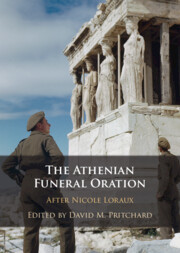Book contents
- The Athenian Funeral Oration
- The Athenian Funeral Oration
- Copyright page
- Contents
- Figures and Tables
- Contributors
- Foreword
- Preface
- Abbreviations
- 1 The Funeral Oration after Loraux
- Part I Contexts
- 2 The ‘Beautiful Death’ from Homer to Democratic Athens
- 3 Between Ideology and the Imaginary: The Invention of The Invention of Athens
- 4 An Imaginary with Images: Reconsidering the Funeral Oration and Material Culture
- Part II The Historical Speeches
- Part III The Literary Examples
- Part IV Intertextuality
- Part V The Language of Democracy
- References
- General Index
- Index of Sources
3 - Between Ideology and the Imaginary: The Invention of The Invention of Athens
from Part I - Contexts
Published online by Cambridge University Press: 11 January 2024
- The Athenian Funeral Oration
- The Athenian Funeral Oration
- Copyright page
- Contents
- Figures and Tables
- Contributors
- Foreword
- Preface
- Abbreviations
- 1 The Funeral Oration after Loraux
- Part I Contexts
- 2 The ‘Beautiful Death’ from Homer to Democratic Athens
- 3 Between Ideology and the Imaginary: The Invention of The Invention of Athens
- 4 An Imaginary with Images: Reconsidering the Funeral Oration and Material Culture
- Part II The Historical Speeches
- Part III The Literary Examples
- Part IV Intertextuality
- Part V The Language of Democracy
- References
- General Index
- Index of Sources
Summary
Few historians would associate Nicole Loraux with the great Marxist historians who wrote on classical antiquity. Nevertheless, Loraux implicitly presented herself as such, when, in 1981 and, again, in 1993, she made ideology and the imaginary central notions in her work on the funeral oration. This chapter investigates the complex uses of these two ‘re-invented’ notions in The Invention of Athens. In particular, it situates the career of Nicole Loraux within her rich intellectual milieu and teases out how she broke from it. This encompassed Classical Studies because The Invention of Athens, by moving the object of study to the imaginary, was clearly responding to some Marxist readings of antiquity, such as those of Moses Finley and the Italian School. But this milieu also included the French intellectual scene because Loraux, in fact, was always engaged in a dialogue with philosophers and anthropologists, such as Louis Althusser, Claude Lefort, Cornelius Castoriadis and Pierre Clastres.
- Type
- Chapter
- Information
- The Athenian Funeral OrationAfter Nicole Loraux, pp. 74 - 88Publisher: Cambridge University PressPrint publication year: 2024

